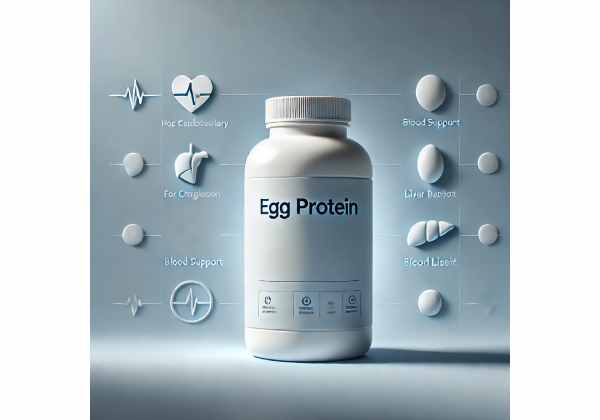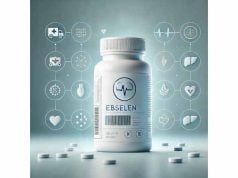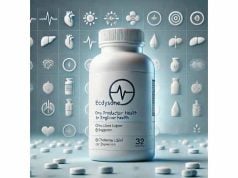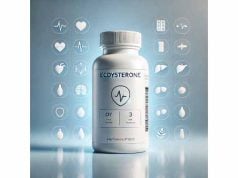
Egg protein sits in a sweet spot: it is naturally complete, highly digestible, and dairy-free, which makes it a practical choice for people who want quality protein without lactose. Whether you use whole eggs in meals or egg-white protein powder in shakes and baking, you get a concentrated source of essential amino acids that supports muscle repair, satiety, and everyday recovery. Because egg protein is neutral in taste and heat-stable in many recipes, it works across breakfast scrambles, smoothies, pancakes, and savory dishes. Safety matters, though: raw egg products can carry Salmonella risk, and raw egg whites can bind biotin. With a few smart practices—choosing pasteurized products, cooking eggs properly, and matching your daily and per-meal targets—you can use egg protein confidently for fitness, weight management, or just a higher-protein diet.
Essential Insights
- Supports muscle repair and fullness; complete protein with all essential amino acids.
- Use pasteurized eggs or cook thoroughly to reduce Salmonella risk; avoid raw whites.
- Typical targets: ~1.4–2.0 g protein/kg/day; 20–40 g per serving with ~2.5–3 g leucine.
- People with egg allergy or those advised to limit protein (e.g., significant kidney disease) should avoid egg protein or seek medical guidance.
Table of Contents
- What is egg protein and how does it work?
- What benefits can you expect from egg protein?
- How to use egg protein day to day
- How much egg protein per day?
- Side effects, allergies, and who should avoid
- Egg protein vs whey, casein, and plant options
What is egg protein and how does it work?
Egg protein refers to the proteins naturally present in eggs—primarily ovalbumin, ovotransferrin, and ovomucin in the white, plus lipoproteins in the yolk. In whole foods, one large egg provides roughly 6–7 g of protein with a balanced spread of essential amino acids. As a supplement, “egg protein powder” is usually spray-dried egg whites (albumen) that deliver about 20–25 g of protein per scoop with negligible fat and carbohydrates. Because the white has almost no lactose or casein, egg protein is a popular alternative for people who cannot tolerate dairy.
On a practical level, egg protein “works” by supplying indispensable amino acids that your body cannot make. After training or physical work, muscle protein synthesis (MPS) rises when you ingest enough high-quality protein that contains sufficient leucine—the amino acid that most powerfully triggers the mTOR pathway involved in building new muscle proteins. In everyday life, a similar effect helps you maintain lean mass during weight loss or periods of lower activity. The advantage of egg protein is its completeness (all essential amino acids), good digestibility, and moderate leucine density, which together support both recovery and satiety.
From a culinary perspective, egg whites are heat-stable enough for pancakes, muffins, and high-protein breads, and they whip for foams and meringues. Unlike whey, egg powders often produce a smoother, less milky texture in baked goods and savory dishes, and they blend cleanly in fruit-based smoothies. For whole eggs, cooking transforms the proteins from a loose network into a firm gel, increasing digestibility and making the amino acids more accessible. That is why cooked eggs and pasteurized egg products are preferred to raw eggs in shakes.
Finally, it is helpful to think of egg options on a spectrum. Whole eggs give you protein plus micronutrients like choline, B vitamins, and fat-soluble vitamins in the yolk. Egg-white protein powder strips out almost all fat and cholesterol, concentrating the protein for targeted dosing with minimal calories. Your choice can be based on your goal (lean protein versus nutrient-dense meal), tolerance (dairy-free), and convenience (powder for fast shakes versus whole eggs for meals). Many people use both: whole eggs at breakfast, egg-white protein powder post-workout or as a late-day top-up.
What benefits can you expect from egg protein?
Reliable muscle repair and maintenance. Egg protein is a high-quality, complete source that helps your body rebuild muscle proteins after exercise and everyday wear-and-tear. When you meet per-meal thresholds (see dosage section), egg protein supports MPS similarly to other complete proteins. For athletes and active adults, that means better recovery between sessions; for people in calorie deficits, it helps preserve lean mass while losing fat. Older adults can especially benefit from consistent, leucine-adequate meals since aging blunts the muscle-building response to smaller protein doses.
Convenient, dairy-free protein. Egg-white powder gives you 20–25 g of protein per scoop with very low fat and carbs and essentially no lactose. If whey or casein cause bloating or congestion, egg can be a clean alternative. Because it is neutral in flavor and less creamy than dairy proteins, it disappears well into fruit-forward smoothies, oatmeal, and baked goods without a milky aftertaste.
Better appetite control. Higher-protein meals increase satiety hormones and typically lead to fewer calories eaten later in the day. Eggs and egg-based breakfasts have been associated with greater fullness and reduced snacking compared with grain-heavy breakfasts of equal calories. Using egg protein powder to raise the protein content of breakfast or lunch (for example, blending it into a smoothie bowl or stirring it into overnight oats) is a simple way to capitalize on this effect without adding much sugar or saturated fat.
Meal flexibility for many goals. Whole eggs bring choline for brain and liver health, lutein and zeaxanthin for eye health, and fat-soluble vitamins—useful if you want nutrient density alongside protein. Egg-white protein powder is strategically lean for cutting phases or weight-class sports, letting you add protein without the extra dietary cholesterol or calories from yolk fat. Both formats cook or mix quickly, making it easier to hit daily protein targets.
Practical digestibility. Cooked eggs and pasteurized egg products are well digested for most people. If you struggle with lactose or experience reflux with rich dairy shakes, egg-white protein may feel lighter. Because egg foam properties are excellent, you can use it for higher-protein baking and still get a pleasing crumb and rise in pancakes, waffles, and quick breads.
Put together, the benefits cluster around three outcomes: (1) supporting muscle and recovery, (2) improving satiety and weight-management efforts, and (3) providing a versatile, dairy-free way to hit protein goals without sacrificing taste or convenience. The key is pairing the right form (whole egg vs egg-white powder) and the right dose with your typical meals, training schedule, and calorie needs.
How to use egg protein day to day
Match the format to the moment.
- Breakfast anchor: Two whole eggs plus extra egg whites or a scoop of egg-white powder whisked into batter boosts protein to 25–35 g while keeping carbs and calories manageable.
- Post-workout shake: Blend 1 scoop egg-white protein with fruit and water, or combine with milk or yogurt if you tolerate dairy and want a creamier texture.
- Protein-forward baking: Replace part of the flour in pancakes or muffins with egg-white powder (start at ~10–15% by weight) to add protein without drying out the crumb.
- Quick savory meals: Add egg whites to stir-fries, fried rice, or soups for a lean protein bump; fold whole eggs into grain bowls for nutrients plus satiety.
Time it around your training.
- For strength or high-intensity sessions, aim for a 20–40 g serving of complete protein within a few hours post-workout. The anabolic window is broad; consistency and total daily intake matter more than exact minutes.
- Distribute protein evenly across 3–4 meals, targeting enough leucine at each meal to turn on MPS (see dosage). For many adults, that means ~25–35 g protein per meal.
Combine for leucine and completeness.
Egg protein has a robust amino acid profile and moderate leucine density. If your per-meal leucine falls short (for example, a light smoothie), pairing egg protein with leucine-rich foods (dairy, soy, or a second scoop if calories allow) can push you to the ~2.5–3 g leucine “trigger” most adults respond to. Older adults often benefit from the upper end of per-meal protein targets to overcome age-related anabolic resistance.
Cook and store safely.
Use pasteurized liquid egg whites for no-cook recipes (e.g., shakes, mousse) and cook shell eggs until whites and yolks are firm for hot dishes. Keep eggs refrigerated at ≤4°C / 40°F, and consume hard-cooked eggs within a week. For powders, store in a cool, dry place and seal tightly to prevent clumping and off-flavors.
Troubleshooting texture and taste.
If a shake feels “frothy,” add ice after blending or switch to a shaker bottle. For baking, sift egg-white powder with dry ingredients and increase liquid slightly to preserve moisture. A pinch of salt and acidity (lemon juice or yogurt) can brighten flavor in sweet recipes.
Sample day (about 1.6–1.8 g protein/kg/day for a 75-kg adult):
- Breakfast: Veggie omelet (2 whole eggs + 120 g liquid egg whites) with toast.
- Lunch: Grain bowl with chicken and a poached egg.
- Post-workout: Egg-white protein smoothie (1 scoop) with banana and berries.
- Dinner: Salmon, rice, and vegetables; add extra egg whites to a side fried rice if targets are short.
- Pre-sleep (optional): High-protein yogurt or a second scoop mixed into oatmeal if you prefer to keep it dairy-free, use egg-white powder instead.
How much egg protein per day?
Daily targets. For most exercising individuals, a practical daily range is ~1.4–2.0 g protein per kilogram of body weight (g/kg/day). During calorie deficits or physique phases, some people go higher (up to ~2.3–3.1 g/kg/day) to help maintain lean mass. These are totals from all protein sources—meals and supplements combined.
Per-meal targets and leucine. Muscle building and maintenance respond to per-meal doses that deliver enough essential amino acids, especially leucine. A useful starting point is ~0.25–0.40 g/kg of high-quality protein per meal (about 20–40 g for many adults). Within that dose, aim to include ~2.5–3.0 g leucine to reliably trigger MPS; older adults often benefit from the higher end. Egg protein typically provides ~1.7–2.6 g leucine per 20–30 g serving; that means ~30–35 g egg protein (from food or powder) usually reaches the leucine sweet spot, or you can pair a 20–25 g serving with other leucine-rich foods.
Timing through the day. Spread intake across 3–4 roughly even meals to give muscles multiple opportunities to synthesize new protein. Post-workout timing is flexible—prioritize hitting your per-meal dose sometime in the several hours after training and meeting your total daily target by day’s end.
What counts as a serving?
- Whole eggs: Two large eggs provide ~12–14 g protein; add extra egg whites or a serving of lean meat, dairy, soy, or egg-white powder to reach 25–35 g at a meal.
- Egg-white protein powder: One scoop delivers ~20–25 g protein; two small scoops or a scoop plus food easily achieve per-meal goals.
- Liquid egg whites: 120 g (about 4 large whites) gives ~14 g protein; combine with whole eggs or other protein foods.
Adapting to your context.
- Older adults (≈60+): Favor the upper end of per-meal (30–40 g) because anabolic resistance reduces the response to smaller doses.
- Weight loss: Keep per-meal protein steady even as calories drop; egg-white powder is useful for adding protein without many additional calories.
- Endurance training days: Continue even distribution. Add a small, protein-containing snack during long sessions if desired for recovery.
Safety with higher intakes. In healthy people with normal kidney function, intakes within these ranges are widely used in sport and clinical nutrition. Individuals with kidney disease, metabolic disorders, or specific medical diets should follow clinician guidance on protein limits and may need lower targets.
Bottom line: Start with 1.4–2.0 g/kg/day, hit ~20–40 g of complete protein per meal, and nudge doses upward (or add leucine-rich companions) if you are older, in a deep calorie deficit, or recovering from heavy training.
Side effects, allergies, and who should avoid
Food safety first. Raw or undercooked eggs can carry Salmonella, a common cause of foodborne illness. Choose pasteurized shell eggs and liquid egg products for recipes that are not fully cooked (e.g., Caesar dressing, tiramisu), and cook eggs until whites and yolks are firm for hot dishes. Keep eggs refrigerated at ≤4°C / 40°F and observe use-by dates. These steps sharply reduce risk and are particularly important for children, older adults, pregnant people, and anyone immunocompromised.
Raw whites and biotin. Raw egg whites contain avidin, a protein that binds biotin (vitamin B7) and can impair its absorption. Cooking denatures avidin, so properly cooked eggs and pasteurized products do not pose this issue. Occasional raw exposure is unlikely to matter for most people, but regularly consuming raw whites is not recommended.
Allergy. Egg is one of the major food allergens. Reactions range from hives and GI distress to anaphylaxis. Anyone with a diagnosed egg allergy should avoid egg protein in all forms, including powders. Individuals with mild childhood allergy sometimes outgrow it—only re-introduce under medical guidance, typically beginning with baked egg if advised.
Digestive tolerance. Egg-white protein is usually easy on the stomach and lactose-free, but large supplemental doses can cause fullness or mild GI discomfort in some people. Splitting servings, blending with fluids, and consuming alongside meals often helps.
Cholesterol and heart health. Whole eggs contain dietary cholesterol. In the general population, current evidence suggests that moderate egg intake as part of an overall healthy diet is not consistently associated with increased cardiovascular disease (CVD) risk. Findings vary by background diet, country, and specific populations. People with type 2 diabetes may need more individualized guidance, as some studies report higher CVD risk with higher egg intakes. Egg-white protein powders contain negligible cholesterol and can be used when dietary cholesterol is being limited.
Kidney disease and medical conditions. Those with chronic kidney disease or on physician-directed low-protein diets should consult their care team before adding protein powders. Similarly, anyone on specialized medical nutrition (e.g., pre- or post-operative regimens) should individualize protein sources and doses with a clinician or dietitian.
Medication and testing. Regular egg consumption does not typically interfere with lab tests. If you take high-dose biotin supplements for hair/skin/nail claims, be aware that supplemental biotin (not egg biotin) can interfere with certain immunoassays; follow your clinician’s instructions on pausing supplements before labs.
Simple safeguards
- Prefer pasteurized eggs or cook thoroughly.
- Avoid raw egg white beverages or foams unless pasteurized.
- Start with 20–30 g egg protein servings to gauge tolerance.
- If you have egg allergy, kidney disease, or diabetes, seek individualized advice.
Egg protein vs whey, casein, and plant options
Whey vs egg. Whey is rapidly digested and relatively rich in leucine, making it highly effective at quickly stimulating MPS. Egg-white protein is also complete and effective, but it is dairy-free and usually a bit lower in leucine per gram than whey. For many, the choice comes down to tolerance (egg for lactose issues), texture (egg is less creamy), and goals (whey can be slightly more “anabolic” per scoop; egg blends cleanly in cooking and suits dairy-free diets).
Casein vs egg. Casein digests more slowly and is often used pre-sleep for a prolonged amino acid release. Egg protein sits between whey’s speed and casein’s slowness in practical use. If you want a lean, dairy-free nighttime option, egg-white protein can be used, but casein is the classic “slow” protein; whole-food choices like cottage cheese perform a similar role if you tolerate dairy.
Single-plant proteins vs egg. Many single plant proteins (rice, pea) can be lower in one or more essential amino acids and may have a lower leucine density per scoop, though high-quality blends close most gaps. Egg protein is complete without blending and has a neutral taste in both sweet and savory recipes. If you prefer plant-only, look for pea-rice blends or fortified options that raise leucine and essential amino acid content.
Whole eggs vs egg-white powder. Whole eggs pack micronutrients (choline, B vitamins, vitamin D in some countries’ fortified products, and carotenoids) alongside protein and fat, making them a nutrient-dense meal base. Egg-white powder is ultra-lean, with nearly pure protein and minimal calories. Use whole eggs to build meals; use egg-white powder to reach precise protein targets without extra fat or cholesterol.
Cost, availability, and versatility. Whey is often cheapest per gram of protein; egg-white powders can be slightly more expensive but are widely available. Egg protein’s culinary range is a quiet advantage: it works in baking, batters, omelets, soups, and smoothies without altering flavor too much, and it whips or gels to create textures that whey and casein cannot replicate.
Bottom line. If you tolerate dairy and want maximum leucine per scoop, whey is tough to beat. If you need dairy-free, want neutral flavor, and value versatility in the kitchen, egg protein is an excellent primary or secondary option. Plant-based athletes can reach similar outcomes with blended plant proteins, typically at slightly higher scoop sizes to match leucine.
References
- International Society of Sports Nutrition Position Stand: protein and exercise (2017) (Guideline)
- Where to Find Leucine in Food and How to Feed Elderly With Sarcopenia in Order to Counteract Loss of Muscle Mass: Practical Advice (2021) (Review)
- What You Need to Know About Egg Safety | FDA (2024) (Guidance)
- Eggs and Cardiovascular Disease Risk: An Update of Recent Evidence (2023) (Review)
- Biotin – Health Professional Fact Sheet (2024) (Fact Sheet)
Disclaimer
This article is for educational purposes only and is not a substitute for personalized medical advice, diagnosis, or treatment. Always consult a qualified healthcare professional before making significant changes to your diet or starting new supplements, especially if you have medical conditions (e.g., kidney disease, diabetes), take prescription medications, are pregnant or breastfeeding, or have a known food allergy.
If you found this helpful, consider sharing it on Facebook, X, or wherever you spend time online, and follow us for future updates. Your support helps us create more high-quality, evidence-based guides.






